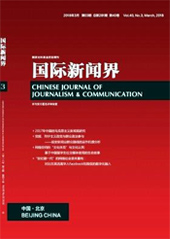News
The Construction of "Double First Class" |School of Journalism and Communication News Seminar No.24--Internationalization of Disciplines in
Author: Time:2020-06-30The School of Journalism of Renmin University of China will hold a conference on June 28, 2020 in the afternoon with the theme of "The 2.0 Era of Internationalization of Disciplines". As the second research meeting of the "14th Five-Year Plan" of journalism and communication, the 24th in-depth study conference was held, and a number of Chinese journalism institutions were invited to attend. Experts and scholars from communication schools discussed the quality, standards, goals, paths and key difficulties in the international development of journalism and communication disciplines. Discussion.

Moderator: Prof. Zhou Yong, Secretary of Party Committee and Vice Dean, School of Journalism, Renmin University of China
Professor Zhou Yong expressed his welcome and gratitude to the experts, and pointed out that although the international development of journalism and communication has made great progress, it has entered a new stage, in which all aspects are in urgent need of brand-new connotation and new breakthroughs and enhancements, and he hoped to discuss with them on related issues.
Speaker: Prof. Hu Baijing, Executive Dean and Deputy Secretary of the Party Committee, School of Journalism, Renmin University of China
Professor Hu Baijing delivered a keynote speech on "Building Academic Discourse System of Journalism and Communication with Chinese Characteristics for the World," explaining that the discipline of journalism and communication in the new era is facing the world to build an academic discourse system with its own characteristics, which should explain and solve Chinese problems, but also be shaped by comparing with and opening up to others.
Speaker: Prof. Gao Xiaohong, Dean and Deputy Secretary of the Party Committee, School of Television, Communication University of China
Professor Gao Xiaohong pointed out that China's journalism and communication education should focus on several points: rooted in the national conditions, promoting the outstanding Chinese traditional culture, exploring the theory and practice of journalism and communication based on new media technology, and learning from the beneficial achievements of developed countries.
Speaker: Mr. Tang Xijun, Director of the Institute of Journalism and Communication, Chinese Academy of Social Sciences, China
Researcher Tang Xijun shared his thoughts on the preparation of the discipline's five-year plan and the key difficulties, and pointed out that the internationalization of the discipline is crucial to the development of the discipline. Three key points to grasp in the 2.0 era: grasp the situation, grasp the big picture and grasp the demand.
Speaker: Prof. Zhang Taofu, Executive Dean and Party Secretary, School of Journalism, Fudan University
Professor Zhang Taofu pointed out that the existing academic education is at a low point, and there is a systematic deviation from the understanding to the practice. At the international level, academic education is often in the state of following rather than leading, and it is necessary to reflect on this situation; on the other hand. It is necessary to break away from past positions and reinterpret the meaning of internationalization in the larger context of the common foundation of human civilization.
Speaker: Prof. Changfeng Chen, Executive Vice Dean, School of Journalism and Communication, Tsinghua University
Professor Chen Changfeng pointed out that on the one hand, it is necessary to think about how to combine Chinese characteristics and the academic characteristics of the college." On the other hand, it is necessary to think about what is the most important background, conditions and standards for facing the world. What kind of disciplinary temperament is actually needed? Professor Chen Changfeng emphasizes the importance of balancing and accommodating Chinese culture and values while maintaining the local ones. Scientific and reasonable standards, which can meet both international and Chinese needs, need to be taken into account in the construction of academic disciplines.
Speaker: Prof. Shan Bo, Director of Wuhan University Media Development Research Center
Prof. Shan Bo proposes a possible realistic path for the internationalization of journalism and communication education: Searching for the distinctive features and internationalization of journalism and communication education in a comparative perspective. balance point; fulcrum of comparative studies to promote capacity building for international scholarly dialogue among faculty; integration of multi-disciplinary approaches into existing curricula. To compare academic disciplines, incorporate multicultural communication philosophies and practices, and find ways to cooperate in schooling and communication in a complementary manner. In the process of cooperation, we will broaden our understanding of international communication issues and enhance our ability to solve international communication problems.
Speaker: Prof. Wei Lu, Dean, School of Media and International Cultures, Zhejiang University
Prof. Wei Lu explained his thoughts on the internationalization goal of the discipline from three aspects: cultivating talents, exploring new knowledge and serving the country. To build an international exchange assessment system, we should shift from the pursuit of numbers to a more structured scientific layout. The development of internationalized disciplines should be fully connected with national needs, and how to gather global resources to promote the development of disciplines is what needs to be further explored. Question.
Speaker: Professor Li Pei, Secretary of the Party Committee and Dean of the School of Journalism and Communication, Southwest University of Political Science and Law
Prof. Li Pei shared her thoughts on specific practices and pointed out the problems in the international development of the discipline: first, the problem of values. Western theories are more "brought in" and less digested and absorbed. Americanization, and the imbalance between importing in and going out. On the basis of this, Professor Li Pei put forward two thoughts: first, to promote the internationalization of the discipline based on Chinese values. Secondly, we should clarify the goal of internationalization of the discipline.
Speaker:Prof. Wang Runze, Vice Dean of School of Journalism, Renmin University of China
Prof. Runze Wang expressed his gratitude to the experts and scholars for their advice and valuable suggestions, and put forward his own reflections on the internationalization of our discipline. Existing standards and experiences, often derived from ready-made practices in Europe and the United States, but in the Chinese socio-cultural context, their internationalization standards It is reasonable to have its own cultural expression, and to think about what and how to build its own localized features in internationalization.
Prof. Zhang Huifeng and Prof. Zhao Yunze, associate deans of the School of Journalism at Renmin University of China, and Associate Prof. Han Xiaoning, Deputy Secretary of the Party Committee of the School of Journalism. Deputy Director of the Development Planning Department of Renmin University of China and Associate Professor Li Biao, a teacher in the School of Journalism, also attended the meeting.
Text: He Tianping, Li Xingbo
Photo: Yang Qiguang, Wu Yi Lane
Editor: Wu Yi Xiang
Instructor: Wang Runze, Sun Quan



